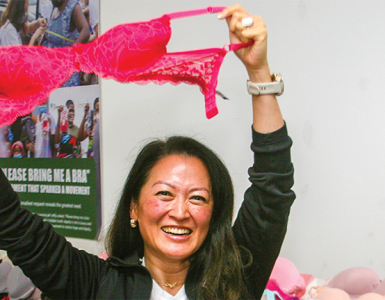POTENTIAL: New research identifies several warning signs that could predict gender-based violence in an intimate relationship…
By WSAM Correspondent
Intimate partner violence or gender-based violence is widespread and can have severe physical and psychological health repercussions for the victims.
New research, published in Social Psychological and Personality Science, identifies several warning signs that precede and predict violence in an intimate relationship. But there is a shortage of research on reliable predictors of abuse before it occurs.
Dr Nicolyn Charlot, the Canada Western University researcher behind the study, says although future research is required to fully understand the associations between warning signs and abuse, “these red flags could eventually be used in interventions to help people learn how to avoid abusive relationships or support loved ones who may be at risk for abuse,”
Charlot says the number of warning signs a person notices, and the frequency of those signs, can predict abuse. In other words, Charlot explains, experiencing one or two warning signs on occasion may not be worrisome, but experiencing multiple warning signs repeatedly could be cause for concern.
During the study, researchers presented 147 participants with a list of 200 abusive and non-abusive thoughts, feelings, and behaviours based on a review of existing research.
Participants indicated how frequently each item had occurred since they started dating their partner. In a second study with 355 participants, researchers identified warning signs that prospectively predicted violence six months later.
The researchers concluded that possible warning signs of abuse may include a partner acting arrogant or entitled, reacting negatively when their partner said no to something they wanted, or disregarding a partner’s reasoning or logic because it did not agree with their own.
Charlot notes that, although these warning signs were shown to predict violence in the research, it does not mean that all people who notice them will experience violence or that these indicators necessarily precede all violence.
“While this research is meant to help educate potential victims of abuse and those around them, that does not in any way mean that people who experience violence are responsible for their abuse,” says Charlot. “Similarly, if a person notices warning signs in someone else’s relationship, that does not mean they are responsible for any abuse that may occur.”
The list of warning signs is not definitive and researchers have identified key areas for future study, including how warning signs may differ in marginalised populations, how different warning signs predict different types of violence, and how people can address warning signs if they appear.
“We hope that other researchers will seek to replicate our findings in different populations and eventually integrate robust warning signs into violence prevention programming,” says Charlot.
According to the World Health Organization (WHO), the prevalence estimates of lifetime intimate partner violence range from 20% in Western Pacific; 22% in high-income countries and Europe; 25% in Americas; 33% in Africa; 31% in Eastern Mediterranean; and 33% in South-East Asia.
Intimate partner and sexual violence is the result of factors occurring at individual, family, community and wider society levels that interact with each other to increase or reduce risk (protective), according to the WHO. Some are associated with “being a perpetrator of violence, some are associated with experiencing violence and some are associated with both”, says the organisation.
ANTI-GBV ACTIVIST TARGETS ABUSERS FOR CHANGE AND RENEWAL
Responsibility: He strongly believes “if we can heal men, we can heal the world”…
By Victor Mecoamere
“A lot of men want to be better men, good husbands, and loving fathers but they have many misconceptions about what masculinity really is.”
This is the assertion of Craig Wilkinson, an anti-gender based violence activist, whose non-profit company, Father A Nation, is playing a big role in the yearly “16 Days of Activism Against Women and Children Abuse” campaign, which started on November 15 and ended on December 10.
Wilkinson’s contention is not to be sneered at, because he is described by publicist Annie Hodes of Angel Fish PR as someone who has seen it all, including having dealt with a father who was planning to commit a famicide – the act of killing own family – and then take his own life, and other husbands who used to assault their partners.
Wilkinson believes the solution to toxic masculinity is healthy masculinity, as the Father A Nation has helped more than 300 000 men over the past 10 years to learn how to be good men, fathers, mentors, and role models through its mindset change programmes.
Wilkinson’s Father A Nation was among many like-minded non-governmental organisations, non-profit organisations and non-profit companies which hosted workshops and seminars at major venues across South Africa to help stem the tide against gender-based violence.
Father A Nation’s mindset change programmes addresses gender-based violence, domestic crimes and fatherlessness by restoring and equipping men to become nation-builders, responsible fathers and positive role models, by teaching men to use their strength to love, serve, protect and provide and to be activists against any form of abuse.
The sessions usually feature 30 and 100 men at a time in open and honest conversations that seek to provide training in positive, healthy masculinity. Wilkinson said that the engagements help the participating men to understand what Gender Based Violence is, examine their own lives and provide the men with the knowledge and motivation to turn their lives around.
“Healthy masculinity never abuses,” says Wilkinson, who is also a bestselling author and motivational speaker; and he adds that: “Many men and women in SA grow up without the presence of a father or positive male figure. This often results in paternal wounds and destructive beliefs about masculinity, with young men looking to figures such as gangsters, abusers, or absent fathers as role models.
“This highlights the critical role of a positive male figure in shaping the minds of boys and men in the country. We work throughout SA with boys and men at schools, universities, in communities and organisations in both the public and private sector. We meet these men where they are at, from taverns to corporations and sports fields. More than 300 000 men have gone through our programmes over the past 10 years, either through soccer tournaments, conversations at taverns, or during dialogues or workshops in communities and camps.
“Our philosophy at Father A Nation is that, if we can heal men, we can heal the world. We focus on working with men to become excellent fathers, mentors, role models and just good men. The solution to GBV is to stop it in its tracks, men are the primary perpetrators of physical and sexual GBV. While it’s critical to create awareness and support victims; ideally, we don’t want victims at all and the way to stop that happening is to stop wounded men from being abusive.”
Wilkinson says that in more intimate dialogues, he often hears stories of how the organisation has helped change people for the better. “In one case, a man told us he had planned to kill his wife and children before killing himself. We hear from men, who say they were abusers but didn’t know this until they attended a session with us. We have met many women who thank us for teaching their partners to be better men.”
Wilkinson adds that providing men with a platform on which they can share their struggles, and to gain the motivation to become better men goes a long way towards helping them to be “a force for good.”
Wilkinson emphasizes that “We look deeply into the reasons why men abuse with the understanding that a reason is not an excuse.”
For more information, visit www.fatheranation.co.za


































